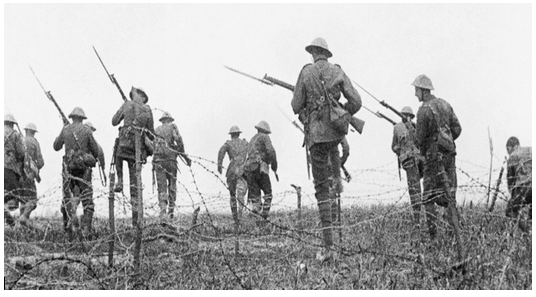CommentsGELFAND’S WORLD--November 11 is an incredibly important date in the history of our civilization.
It signifies a deep lesson that our leaders are in danger of forgetting, something I will return to below.
November 11, 2018 marked the 100th anniversary of the end of the Great War, or as we refer to it nowadays, The First World War. The war ruined the prevailing governmental structures -- the dukedoms and monarchies of western Europe -- and resulted in a complete reorganization not only of governments but also of power balances.
It resulted in the redrawing of boundaries in the middle east, affecting that region to this day.
And this short summary doesn't even mention the effect the war had on the creation of international communism, starting with the Bolsheviks in Russia.
And we're just barely grazing the story of the misery and suffering, the 16 million or so dead (including the combined number of soldiers and civilians) and the mass destruction of cities and towns.
As an aside, there was an enormous effect on popular culture. I've written previously about the way that western cinema reacted. After the war, it was still possible to think of WWI as the war to end wars. In the 1920s, literature and film were willing to treat the concept of ultimate war as something to be avoided at all costs. Movies in the late 1920s could be directly antiwar without being treated as some kind of affront to patriotism. Rudolph Valentino's film The Four Horsemen of the Apocalypse treated the war's effects on one family and on the people as tragic. Another postwar film, The Big Parade (the title refers to the soldiers' jargon for the caravans moving towards the front) gives credit to individual heroism while at the same time dealing with the mass suffering along the French front lines.
For those who haven't yet read All Quiet on the Western Front, it's worth doing so. For another form of antiwar literature, there were a group of writers referred to as the war poets, the most famous of whom, Wilfred Owen, was killed in battle on November 4, 1918, almost exactly a week before the official armistice.
 This was the first great war to be covered by official filmed documentaries (The Battle of the Somme) and extensive newsreel footage. A nearly forgotten documentary about the Italian unknown soldier inspired my earlier column A Message From Gloria. Hardly anyone outside of Italy remembers that on the Italian side alone, there were 650,000 dead over a 3-year period (1915-18) in a narrow zone between Austria and northeastern Italy.
This was the first great war to be covered by official filmed documentaries (The Battle of the Somme) and extensive newsreel footage. A nearly forgotten documentary about the Italian unknown soldier inspired my earlier column A Message From Gloria. Hardly anyone outside of Italy remembers that on the Italian side alone, there were 650,000 dead over a 3-year period (1915-18) in a narrow zone between Austria and northeastern Italy.
The Deep Lesson from the War
High school students are taught about the assassination of Archduke Franz Ferdinand in June 1914 in Sarajevo, but to our modern sensibility, it is not immediately obvious how this one act could lead to four long years of killing and destruction. The vast differences between 1914 and the more recent era might be signified by the fact that the U.S. and the USSR managed to avoid a third world war during the Cuban missile crisis. Why the difference?
The great question that was asked post-WWI was why this single assassination had such tragic consequences.
The subject has been discussed in great detail, even to the extent that Wikipedia will explain in excruciating fashion the complex interconnection of alliances that caused nations to declare war on each other based on treaty obligations. But in our modern day we also have treaty obligations (NATO, SEATO, at one time the Warsaw Pact) and we have avoided WWIII.
Barbara Tuchman explained in The Guns of August how the rival generals in France and Germany were spoiling for a fight. That's certainly part of the story. But surely there were some among the leadership who weren't automatically wedded to mass slaughter, or even modest slaughter.
But we ultimately come down to the realization that the world's leaders were irresponsible and ultimately reckless, carried away with class pride and egotism. The demands that were made after the assassination could only lead to war given the personalities involved, and the leadership failed to show the wisdom that could have saved 16 million lives.
We can hope that our institutions and our historical awareness are stronger now than what existed in Europe in 1914. Nevertheless, we should be careful to understand that the civilized, highly cultured world of 1914 blew itself to pieces by mutual agreement. We need to remain cognizant that our leaders must be kept under control lest by overreaching they lead us into another such conflict. It is a moment in history when our American legislative leaders need to keep control over the presidency that is doing its best to imitate the arrogant fools of 1914.
(Bob Gelfand writes on science, culture, and politics for CityWatch. He can be reached at [email protected])
-cw
















